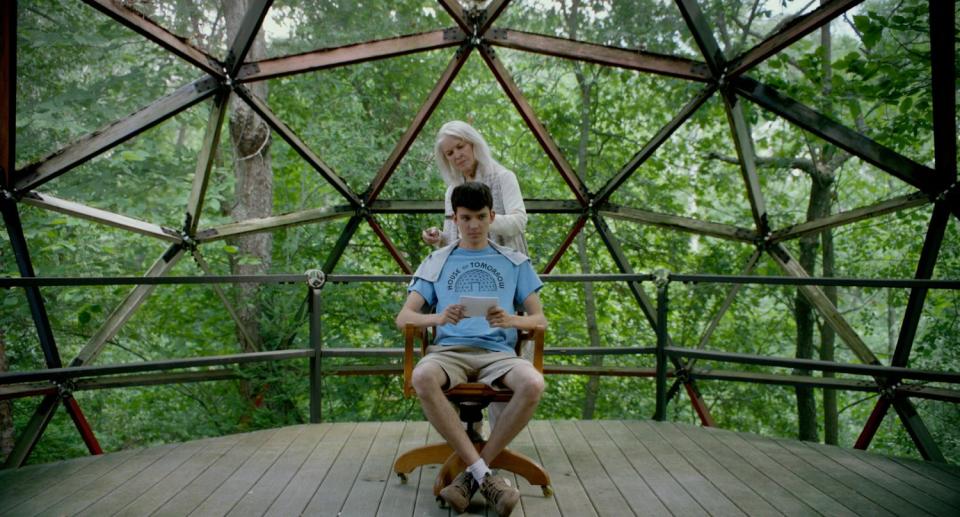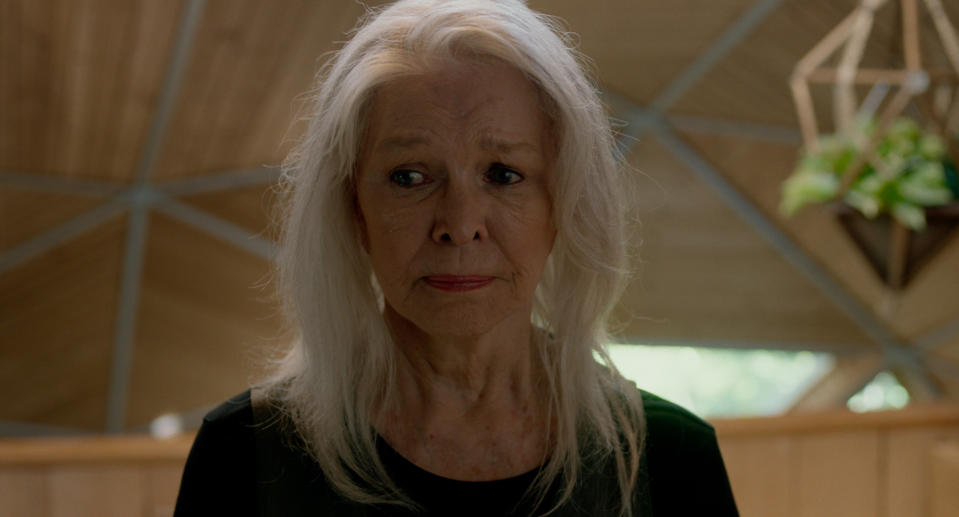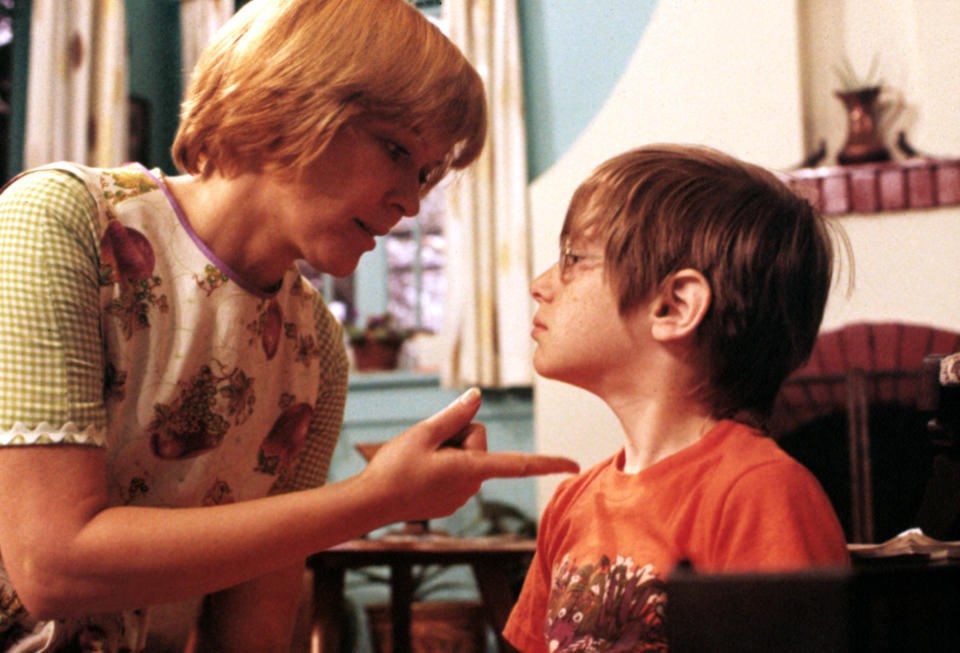Ellen Burstyn's hopes for the future of the #MeToo movement, predictions for the final season of 'House of Cards'

Despite what the title suggests, Peter Livolsi’s new drama The House of Tomorrow takes place in the present day. Still, the future is very much on the mind of the film’s central characters, Josephine (Ellen Burstyn) and her grandson, Sebastian (Asa Butterfield). You might say it’s all around them, in fact. A disciple of the forward-thinking architect Buckminster Fuller, Josephine lives in one of the eye-catching geodesic domes that Fuller tried to popularize in the midcentury. However, it proved to be an architectural trend that never really took off, and these days only curiosity seekers stop by to visit.
That’s their loss, because Burstyn, for one, believes that Fuller’s domes continue to possess a grandeur that live up to the movie’s title. “They still look futuristic to me,” the Oscar-winning actress tells Yahoo Entertainment. “I actually had not ever been inside one of the domes until this movie, and I found it really beautiful. The way you’re living in the woods and seeing outside everywhere is really comforting. It’s almost like you’re living inside a tree and you’ve become part of the forest.” We spoke with Burstyn about the advice she would impart to the young actors of today (and tomorrow) and why she believes the #MeToo movement has a healthy future.
Yahoo Entertainment: It’s always fascinating to see how people from decades past envisioned the future. When you were growing up, what were you own ideas about how the future might look? Did you imagine yourself living in a house like Fuller’s geodesic dome?
Ellen Burstyn: I don’t think I had any thoughts about the future when I was growing up. My own future is what I was concerned with. I wanted to see the world and travel to as many exotic places as I could. Being an actress was a way of making a living so I could do that, and that was really my ambition more than the profession itself. Whenever I would see a movie and it was set in Arabia or some far off place, I wanted to go there. I wanted to live in a tent or in a houseboat or all the different ways that people live around the world. I must say I did get to see an awful lot of them. I was fortunate to travel through most of it when it was still possible. I found Jerusalem really moving, I spent time in Iran, and I tracked the wild gorillas in Rwanda. I’ve fulfilled my ambition of seeing the world.
It sounds like you’re very much drawn to places with a lot of history attached to them.
Absolutely. Especially in places like Rome, where buildings have been standing for hundreds of years, or Greece for that matter. They have a different feeling than visiting, say, sculptures in a museum — the past comes alive. When you go walk around the buildings and visit a tomb where they’re pretty sure Jesus was buried, things like that are very inspiring.
You have a long history of working closely with young actors, from Linda Blair in The Exorcist to Jodie Foster in Alice Doesn’t Live Here Anymore. Do you notice a difference between young actors today versus then in terms of training or how they approach acting?
I would say that television has influenced actors; I think actors who get a job quickly early on in their careers in television think that’s what acting is like. I don’t know that they’ve studied the way we did years ago, when we came to New York and went to Lee Strasberg or Stella Adler or some of the great teachers that were around then, and really developed our craft for the stage and then later got into movies. That was a different approach than auditioning for a television series right out of high school, getting on it, and thinking that’s what acting is.
My wish for young actors would be that they spend more time in classes really studying the art of acting, rather than just what you come up with on your own. You get to work on Shakespeare, for instance. I’m always encouraging actors to come to the Actors Studio, to audition and have a place to work free of charge. I think that actors cheat themselves when they don’t study. A concert pianist wouldn’t think of only playing the piano when he or she had a concert — they’re practicing all the time. For actors, we need a stage and an audience; we can’t do it at home, because whatever we do at home falls apart when we get in front of a crowd. That’s my advice: Get in the class.
How about today’s class of young directors? How do they differ from filmmakers like Martin Scorsese and William Friedkin, both of whom you worked with early on in their careers?
It used to be that the director would be right underneath a camera, watching the scene up close and watching the acting in the scene. That doesn’t happen anymore — now the directors are in what’s called Video Village, and they’re over looking at the monitor. They’re looking at the shot, but it’s a different focus; it’s from the camera, and what the camera’s doing. Yes, the actor’s part of that, but it’s not the same as really being there where the camera is and watching the actors up close. I think something has been a little bit lost with that.
Alice Doesn’t Live Here Anymore was part of a wave of ’70s movies that put women’s stories center stage. That seems to be coming around again thanks in part to the #MeToo movement. Are you excited to see where that movement is going and how it’s going to affect Hollywood creatively?
Oh, definitely. I think it’s wonderful. I personally am so sick of seeing movies with explosions and guns and sabers and knives and violence. I went to see a movie a couple weeks ago, and I saw 20 minutes of previews where every single film was just war of one kind or another and violence of one kind or another. I’m not attracted to those kinds of films at all, so I’m hoping that with more women directors, more women writers, and more women producers, more human stories are told other than just more images of violence. I think we’ve got enough violence in the newspaper, in the news without having to go see it for entertainment. Since the fall of Crete we’ve been living under a patriarchy, with patriarchal values, and I think now we’ve finally gotten to the point where we’re ready to consider more equality between human beings. That can only be healthy for the planet, and for us.

Were there barriers in the ’70s that prevented a movement like this flourishing then?
When I put Alice Doesn’t Live Here Anymore together, it was at the time of the women’s movement. Gloria Steinem had founded Ms. magazine, and there was a lot of energy around, but it kind of faded, I must say. The next generation of women didn’t really have a clear understanding of how much we had changed the way it was, and they took it for granted. Now I think it’s finally going to take the next step; the #MeToo movement is the next step after the feminism of the 1970s. These changes take time; they don’t always go overnight. I think this is real and it’s deep and it’s needed and it’s time.

Is there a female director working right now that you’re particularly eager to work with?
I’m scheduled to direct something myself. I have a script called Bathing Flo, and I’ve been trying to get on it for three years and, if I ever do it, I expect to do it this year. I play a woman whose son goes away to rehab because he’s an alcoholic, and he knows an actor who is also a waiter and gets thrown out of his apartment. So he says, “You can stay at my place” and fails to mention that his mother lives in the apartment! Neither of them like each other at all: She wants to get rid of him, and he wants the free rent. So it’s about their relationship, and it’s wonderful. I’ll be acting and directing, so I’m the director I want to work with! [Laughs]
House of Cards is coming back later this year for one more season. Your character — Claire Underwood’s mom, Elizabeth Hale — died in Season 4, but is there any chance of a flashback cameo?
They haven’t [indicated] to me that they’re thinking of that. I wish they would, but I don’t think so. I’m interested to see how the show’s gonna go now — I guess my daughter will become president, right? [Laughs]
Are you happy they’re giving Claire her moment in the spotlight?
Yes, I was very glad. Robin [Wright] is such a wonderful woman; she directed one of the episodes that I did, and she’s very smart and very kind and very creative. I just think the world of her, so I’m glad that she’s going to get to be president. I mean, I assume she is! I don’t know that.
Do you have any theories about how they might write Frank Underwood (Kevin Spacey) off the show?
I haven’t talked to anybody about it. I assume he’ll be assassinated, but I don’t know. That’s a guess!
The House of Tomorrow opens in theaters April 27.
Read more from Yahoo Entertainment:

 Yahoo Movies
Yahoo Movies 
